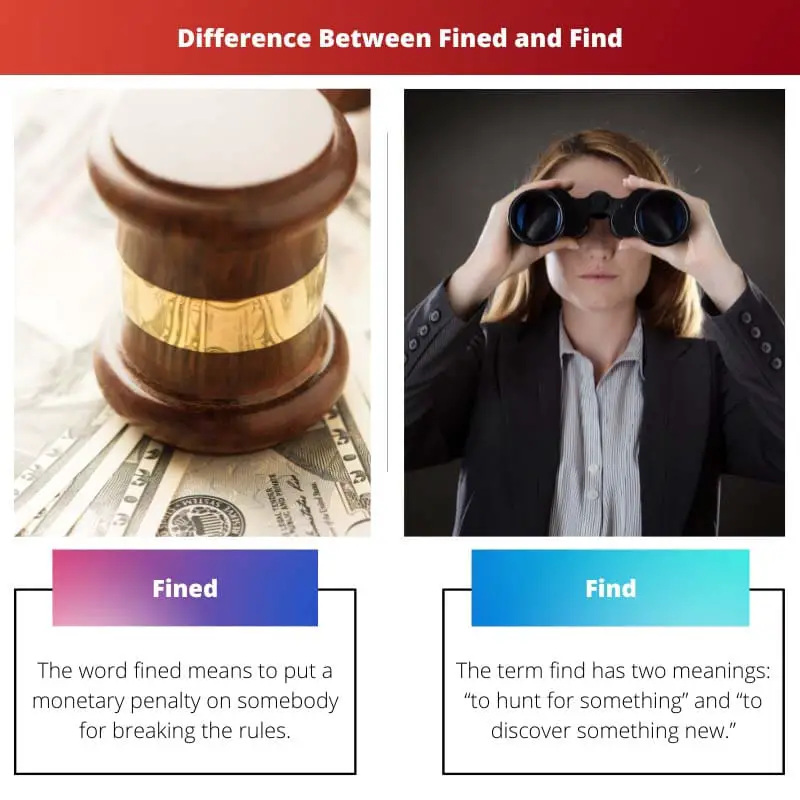A homophone is a very well-known concept in the English language. The word homophone is from the Greek language, which means some words that have identical pronunciation while speaking but are different in meaning.
Fined and Find are two such words that are similar in sound but different in spellings and meanings. We can not use them at the each-others place in English.
Key Takeaways
- Fined is a verb that means to impose a monetary penalty on someone for breaking a rule or law.
- Find is a verb that means to discover something or to determine the existence of something.
- Fined is punitive, whereas Find is investigative.
Fined vs Find
Fined is a term to describe the past tense and past participle of the verb fine. It means to impose a monetary penalty as punishment for breaking a law or rule. Find, means to discover or locate something that was previously lost or unknown. It can also refer to coming across something unexpectedly.

The word fined has been known since the late 13th C. It means to indicate that in past, somebody was penalized in terms of money.
The word fined is the past participle of the verb fine, and it is a transitive verb (requires a direct object while using). It is a homophone of the word find.
The word find can be both a verb and a noun depending on the usage. When it is a verb, its meaning is to discover or observe something.
When find is a noun, then it means to discover something new. It is used to indicate present and future scenarios. Its synonyms are search, hunt, and invention.
Comparison Table
| Parameters of Comparison | Fined | Find |
|---|---|---|
| Meaning | The word fined means to put a monetary penalty on somebody for breaking the rules. | The term find has two meanings: “to hunt for something” and “to discover something new.” |
| Origin | The word fined has been taken from the French Language. | The English word “find” has been derived from proto German. |
| Parts of Speech | The word fined is a transitive verb. | The word find is both a noun and a verb. |
| Type of Tense | The word fined indicates past happenings. | The word “find” describes the present and upcoming happenings. |
| Example | You were fined due to overspeeding. | Please find my vital document. |
What is Fined?
The English word fined is the past participle of the transitive verb fine. The word fine has multiple meanings. But if we use it as a verb, it means to pay a monetary penalty against breaking legal rules.
It first appeared in the late thirteenth century as a verb. Otherwise, the word fine can be a noun and an adjective in a different context.
Although the word fined sounds similar to the word find, its meaning is very different.
However, there is only a slight difference in the spelling of fined and find. So, people, especially non-natives of the English language, get baffled about which word to use and how to use it.
Add the letter D to the end of the word fine while speaking or writing about paying a fine in the past. It is a simple trick to remember the spelling of the word fined.
Moreover, when indicating paying a fine in the present and future, we use the verb fine instead of fined. We can quickly learn its usage while making the sentence.
For example
- He was fined Rs 300 for appearing late at school.
- She has been fined for overspeeding.
The word fined refers to a penalty in the form of money in both sentences.
What is Find?
The word “find” comes from the English language. In the English language, it is both a noun and a verb. It originates from proto-German. The word find has two meanings, depending on the parts of the speech.
If the word “find” acts as a noun, it refers to a discovery of something. It has been a noun since the mid-nineteenth century. If the term find is used as a verb, it signifies to look for something.
Like, the English word fined, the word find is also a transitive verb (a direct object must be present in a sentence). Since the word find is the first form of the verb. The verb’s second and third form is English word found.
Thus, we use the term found rather than the word find in the English language for past events. This term refers to historical discoveries or something that was searched in the past.
In English, the word “find” is easy to use when learning its usage in a sentence.
For example
- He finds his ball for playing with friends.
- He finds an effective way of saving water.
In the first sentence, The word find is a verb, and in the second sentence, it is a noun. So, according to the first sentence, the synonym of find is hunt, and in the second sentence, its synonym is discovery.

Main Differences Between Fined and Find
- The word fined means to pay some money as a part of the punishment. On the other hand, the word find means to search the object or any new invention.
- The word fined is for making a sentence of past. On the contrary, the word find is for mentioning present and future occurring.
- The word fined is a transitive verb. On the other side, the word find can be a noun and a verb.
- The word fined has its roots in France. On the other hand, the word find is proto German.
- The word fined consists of five letters. However, the word find has four letters.




